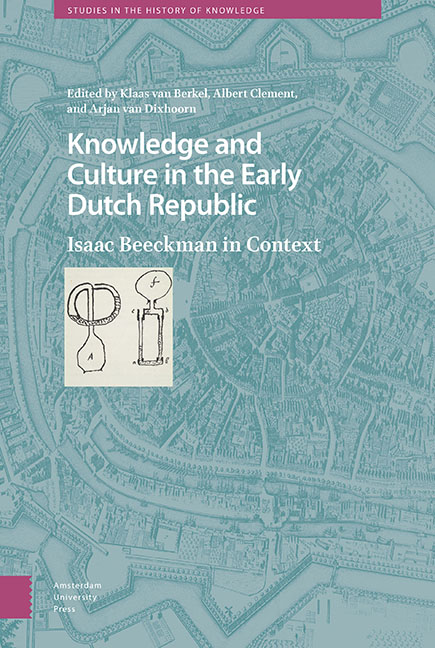6 - Optics, Astronomy, and Natural Philosophy: Beeckman, Descartes, Kepler, and the Dutch Connection
Published online by Cambridge University Press: 07 October 2022
Summary
Abstract
The place of Isaac Beeckman in the history of philosophy and science is paradoxical. On the one hand, through recent works (Klaas van Berkel) there is no longer any doubt that he was one of main promoters of the mechanical philosophy; on the other hand, his name still remains in the shadows of the great names (Descartes, Kepler, Galileo, Gassendi). This chapter attempts to relate Beeckman's way of thinking as closely as possible to the reality of his intellectual network and his scientific activity. Starting from a strictly local analysis, and from questions that have been partly forgotten by historians of the long term, this chapter tries to recover a part of an original train of thought that cannot be reduced to the thought patterns (e.g. abstraction and idealization) that are traditionally presented as the drivers of the Scientific Revolution.
Keywords: Isaac Beeckman, René Descartes, Johannes Kepler, Martinus Hortensius, potentia dei, reflecting telescope
The discovery and publication, in the first half of the twentieth century, of Isaac Beeckman's Journal made it possible to understand the role played by Beeckman in the development of the new ‘mechanistic’ physics, of which the principal actors were already well-known: Marin Mersenne, René Descartes, Pierre Gassendi, and Thomas Hobbes. In this context, Beeckman was first perceived as the missing piece in an already fully-formed puzzle, one in which he simply had to be fitted, with perhaps some rounding off at the edges where the new piece failed to fit perfectly into the space allocated for it. Since then, studies more specifically centred on Beeckman – including Klaas van Berkel's eminent and pioneering work – have made it possible to better understand the particularities of Beeckman's ‘mathematico-physical’ philosophy without measuring him against the standards of this ‘greater picture’ in which his philosophy had haphazardly been integrated, as was done previously.
A third step, which I aim to sketch here, might involve trying to understand how Beeckman's original philosophy was created by situating itself into a fabric of local relationships, through intensive and ongoing exchanges on specific well-defined questions that bore not so much on the great scientific discoveries of Galileo Galilei or Johannes Kepler, but on what made these discoveries possible in the first place.
- Type
- Chapter
- Information
- Knowledge and Culture in the Early Dutch RepublicIsaac Beeckman in Context, pp. 129 - 156Publisher: Amsterdam University PressPrint publication year: 2022



